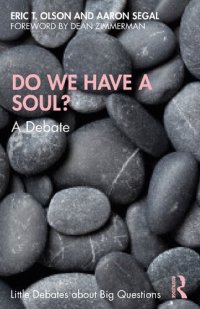
Ebook: Do We Have a Soul? A Debate
Author: Eric T. Olson Aaron Segal
- Genre: Other Social Sciences // Philosophy
- Series: Little Debates About Big Questions
- Year: 2023
- Publisher: Routledge
- City: New York
- Language: English
- pdf
Are we made entirely of matter, like sticks and stones? Or do we have a soul—a nonphysical entity—where our mental lives take place?
The authors Eric T. Olson and Aaron Segal begin this accessible and wide-ranging debate by looking at the often-overlooked question of whether we appear in ordinary experience to be material things. Olson then argues that the dependence of our mental lives on the condition of our brains—the fact that general anesthesia causes complete unconsciousness, for instance—is best explained by saying that our mental lives are physical activities in our brains rather than nonphysical activities in the soul. Segal objects that this view is incompatible with two obvious and important facts about ourselves: that there is only one of you rather than trillions of almost identical beings now thinking your thoughts, and that we exist and remain conscious for more than an instant. These facts, he claims, are presupposed in our practical and moral judgments—but they require us to be immaterial things. Olson is forced to concede that there is no easy and uncontroversial answer to these objections but doubts whether taking us to be immaterial would be any help. The debate takes in large philosophical questions extending well beyond dualism and materialism.
The book features clear statements of each argument, responses to counter-arguments, in-text definitions, a glossary of key terms, and section summaries. Scholars and students alike will find it easy to follow the debate and learn the key concepts from metaphysics, philosophy of mind, and other areas necessary to understand each position.
Key Features
Is the only introductory book devoted to the debate between substance dualism and materialism
Discusses both traditional and novel arguments for each position
Debates important but infrequently discussed questions, including
do we appear, in ordinary experience, to be material?
should materialism be the default view?
is there a good probabilistic argument for materialism?
Written in a lively and accessible style
Uses only a limited number of technical terms and defines all of them in the glossary
The authors Eric T. Olson and Aaron Segal begin this accessible and wide-ranging debate by looking at the often-overlooked question of whether we appear in ordinary experience to be material things. Olson then argues that the dependence of our mental lives on the condition of our brains—the fact that general anesthesia causes complete unconsciousness, for instance—is best explained by saying that our mental lives are physical activities in our brains rather than nonphysical activities in the soul. Segal objects that this view is incompatible with two obvious and important facts about ourselves: that there is only one of you rather than trillions of almost identical beings now thinking your thoughts, and that we exist and remain conscious for more than an instant. These facts, he claims, are presupposed in our practical and moral judgments—but they require us to be immaterial things. Olson is forced to concede that there is no easy and uncontroversial answer to these objections but doubts whether taking us to be immaterial would be any help. The debate takes in large philosophical questions extending well beyond dualism and materialism.
The book features clear statements of each argument, responses to counter-arguments, in-text definitions, a glossary of key terms, and section summaries. Scholars and students alike will find it easy to follow the debate and learn the key concepts from metaphysics, philosophy of mind, and other areas necessary to understand each position.
Key Features
Is the only introductory book devoted to the debate between substance dualism and materialism
Discusses both traditional and novel arguments for each position
Debates important but infrequently discussed questions, including
do we appear, in ordinary experience, to be material?
should materialism be the default view?
is there a good probabilistic argument for materialism?
Written in a lively and accessible style
Uses only a limited number of technical terms and defines all of them in the glossary
Download the book Do We Have a Soul? A Debate for free or read online
Continue reading on any device:

Last viewed books
Related books
{related-news}
Comments (0)